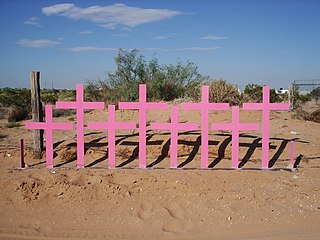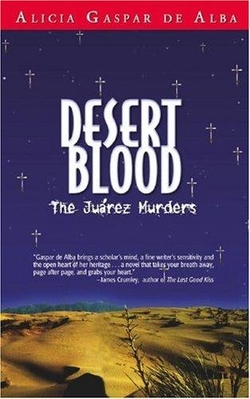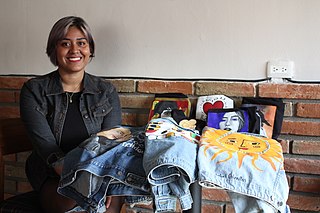Related Research Articles

Ciudad Juárez, commonly referred to as just Juárez, is the most populous city in the Mexican state of Chihuahua. It was known until 1888 as El Paso del Norte. It is the seat of the Juárez Municipality with an estimated population of 2.5 million people. Juárez lies on the Rio Grande river, south of El Paso, Texas, United States. Together with the surrounding areas, the cities form El Paso–Juárez, the second largest binational metropolitan area on the Mexico–U.S. border, with a combined population of over 3.4 million people.

More than 500 women were killed between 1993 and 2011 in Ciudad Juárez, a city in northern Mexico. The murders of women and girls received international attention primarily due to perceived government inaction in preventing the violence and bringing perpetrators to justice. A narcofosa containing the remains of women killed in 2011 and 2012 was found in Madera Municipality, Chihuahua, in December 2016.
Abdul Latif Sharif, first name also spelled Abdel, was an Egyptian-born Mexican chemist and chief suspect in the Juárez killings, a decade-long murder spree that began in the Mexican city of Ciudad Juárez in the early 1990s.

Femicide or feminicide is a term for the murdering of women, often because of their gender. Femicide can be perpetrated by either sex but is more often committed by men. This is most likely due to unequal power between men and women as well as harmful gender roles, stereotypes, or social norms.

Norma Esther Andrade is one of the founding members of Nuestras Hijas de Regreso a Casa A.C., a Mexican non-profit association of mothers whose daughters have been victims of female homicides in Ciudad Juárez. Her daughter, Lilia Alejandra García Andrade, disappeared on February 14, 2001. On February 21, Lilia Alejandra's body was found wrapped in a blanket. On her body were signs of physical and sexual assault.

Bordertown is a 2007 American crime drama film written and directed by Gregory Nava, and starring Jennifer Lopez, Martin Sheen, Maya Zapata, Sônia Braga and Antonio Banderas. This is the second film which featured the collaboration between Nava and Lopez, following the 1997's biopic film Selena.
Human rights in Mexico refers to moral principles or norms that describe certain standards of human behaviour in Mexico, and are regularly protected as legal rights in municipal and international law. The problems include torture, extrajudicial killings and summary executions, police repression, sexual murder, and, more recently, news reporter assassinations.

Susana Chávez Castillo was a Mexican poet and human rights activist who was born and lived most of her life in her hometown of Ciudad Juárez.

Marisela Escobedo Ortiz was a Mexican social activist from Juarez, Chihuahua, who was assassinated while protesting the 2008 murder of her daughter.
Campo Algodonero in Ciudad Juarez, Chihuahua, Mexico, is the memorial site for hundreds of women who have died during the past two decades. The Algodonero became an important site after eight women were found dead in 2001. This memorial site was recently created after the verdict of the Inter-American Court of Human Rights against the State of Mexico in regards to the case of the Algodonero field where eight women were found dead. The memorial site includes a statue of a woman, made by Veronica Leiton, and multiple pink crosses that represent the women who were found. Campo Algodonero serves as a standing symbol of memory that dwells in the lives of all of the victims’ families who refuse to stay quiet and who are constantly in the middle of controversy.

Desert Blood: The Juarez Murders is a 2005 mystery thriller by author Alicia Gaspar de Alba based on the violence, kidnapping and femicides that occurred in Ciudad Juarez in 1998.

Sergio González Rodríguez was a Mexican journalist and writer who was best known for his works on the femicides in Ciudad Juárez from the 1990s to the 2000s, such as Huesos en el desierto and The Femicide Machine. González Rodríguez was a writer who worked in many literary genres, producing literary journalism or crónicas[es], novels, essays, and screenplays for documentaries. His writing was recognized with several awards in Mexico and Spain.
Alejandro Máynez is a Mexican alleged serial killer and fugitive. Along with Ana Benavides and Melchor Máynez, he killed at least two women in Ciudad Juárez, but he is believed to be responsible for 50 victims in all. His murders are organized and motivated by sexual compulsion, committed as part of a group.
Violence against women in Mexico includes different forms of gender-based violence. It may consist of emotional, physical, sexual, and/or mental abuse. The United Nations (UN) has rated Mexico as one of the most violent countries for women in the world. According to the National Institute of Statistics and Geography in Mexico (INEGI), 66.1 percent of all women ages 15 and older have experienced some kind of violence in their lives. Forty-nine percent have suffered from emotional violence; 29 percent have suffered from emotional-patrimonial violence or discrimination; 34 percent from physical violence; and 41.3 percent of women have suffered from sexual violence. Of the women who were assaulted in some form from 2015 to 2018, 93.7 percent did not seek help or report their attacks to authorities.
Pedro Padilla Flores, also known as The Rio Bravo Assassin among many other aliases, is a Mexican serial killer who was convicted of killing three women in Ciudad Juárez but is suspected of murdering up to 27 more, some of whom were underage. He was captured and sentenced to prison time for three murders in 1986, but he escaped in 1990 and, after remaining a fugitive from justice, was recaptured in New Mexico and deported back to Ciudad Juárez. On January 24, 2014, ICE agents delivered Padilla to agents from the Mexican Ministerial Police. Currently, he is one of the main suspects in the unsolved femicides in Ciudad Juárez. He was a disorganized, sedentary, hedonistic murderer motivated by sexual compulsion and predatory behaviour.
The Ciudad Juárez Rebels is the self-imposed name of a group of Mexican serial killers who were active between 1995 and 1996 in Ciudad Juárez, and are responsible for several feminicides in the city. The group was led by Sergio Armendáriz Diaz and Juan Contreras Jurado. Three other members of the group were sentenced in 2005: Carlos Barriento Vidales, Gerardo Fernández Molina and Romel Omar Ceniceros Garcia.
The Feminicides of the cotton field is the media name for murders committed by two Mexican serial killers, Edgar Ernesto Álvarez Cruz and José Francisco Granados de la Paz. Both were active between 1993 and 2003, in the city of Ciudad Juárez. According to his own statements, Granados kidnapped, tortured, raped and murdered at least 8-10 young women, but according to the Attorney General of the State of Chihuahua they murdered at least 14 women. This corresponded to the 8 corpses found in cotton fields in the city's outskirts and 6 more found in Mount Cerro Negro, also adjacent to the city.

Isabel Cabanillas de la Torre was a Mexican artist, and activist with Mesa de Mujeres. She was also a member of Hijas de su Maquilera Madre an anti-capitalist feminist collective from Ciudad Juárez, with which she protested against femicides in the city.

Femicide, broadly defined as the murder of a woman motivated by gender, is a prevalent issue in Latin America. In 2016, 14 of the top 25 nations with the highest global femicide rates were Latin American or Caribbean states. In 2021, 4,445 women were recorded victims of femicide in the region, translating to the gender-based murder of about one woman every two hours in Latin America.

Mexico has one of the world's highest femicide rates, with as many as 3% of murder victims being classified as femicides. In 2021, approximately 1,000 femicides took place, out of 34,000 total murder victims. Ciudad Juárez, in Chihuahua, has one of the highest rates of femicide within the country. As of 2023, Colima State in Mexico has the highest rate of femicide, with over 4 out of every 100,000 women were murdered because of their gender. Morelos state and Campeche state were the following in terms of highest rates of femicide by 2023.
References
- ↑ The Femicides Continue 2020
- ↑ Amnesty International, Mexico: Justice fails in Ciudad Juárez and the city of Chihuahua 28 February 2005.
- ↑ BBC News, No end to women murders in Mexico 23 November 2005.
- ↑ Juarez Short Film duration 9 minutes 4 seconds
- ↑ Channel 4 News, "Missing in Mexico - Maria's Story" January 2010
- ↑ "The Foreign Press Association | index". www.foreign-press.org.uk. Archived from the original on 6 July 2011. Retrieved 12 January 2022.
- ↑ CNDH Study